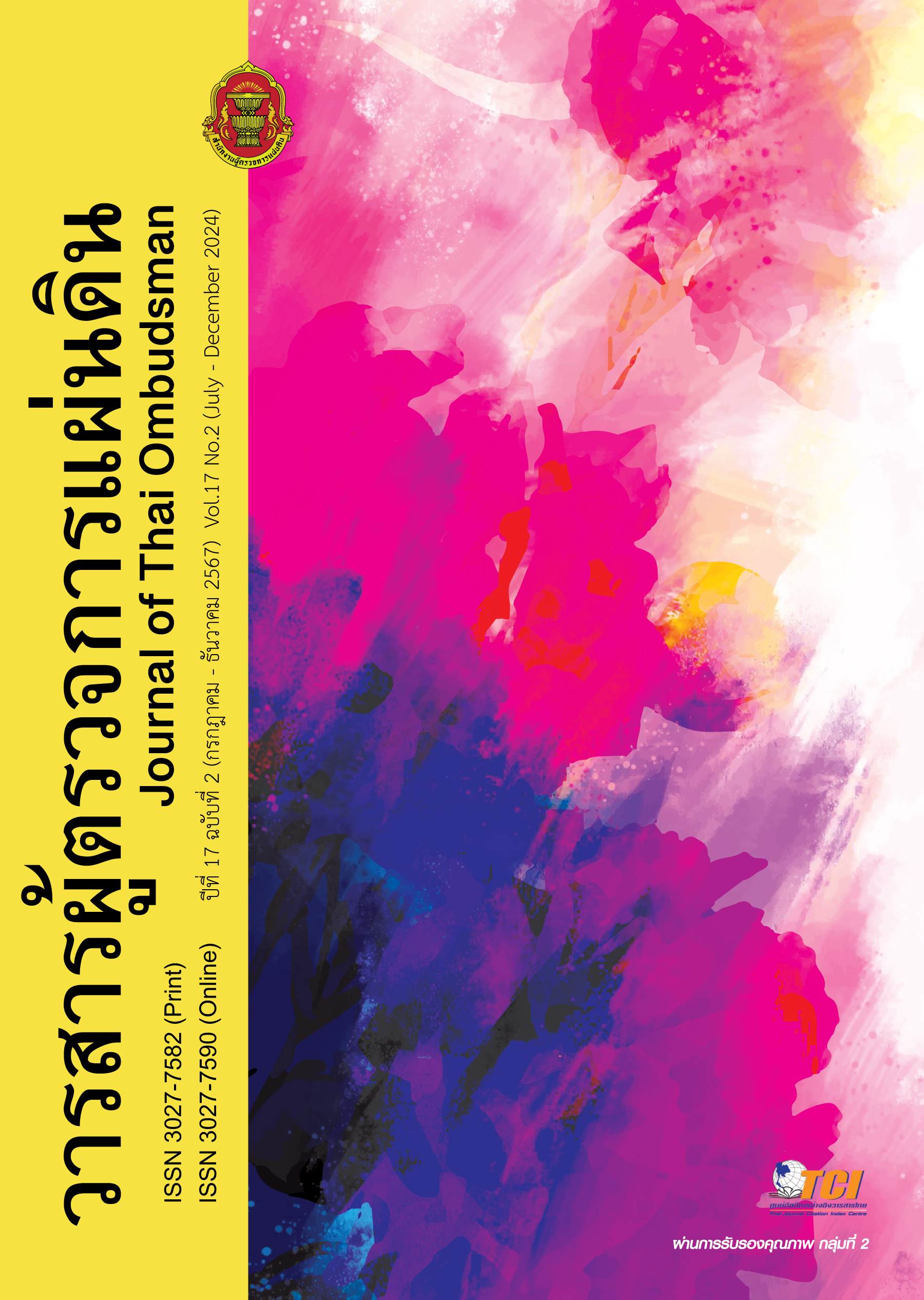แนวทางการศึกษาเพื่อพัฒนากลไกการกำกับดูแลของคณะกรรมาธิการศึกษาการจัดทำและติดตามการบริหารงบประมาณผ่านมุมมองทฤษฎีสถาบัน
คำสำคัญ:
หลักความรับผิดชอบ, คณะกรรมาธิการศึกษาการจัดทำและติดตามการบริหารงบประมาณ, องค์กรตรวจสอบสูงสุด, ทฤษฎีสถาบันบทคัดย่อ
ความสัมพันธ์ระหว่างคณะกรรมาธิการศึกษาการจัดทำและติดตามการบริหารงบประมาณและสำนักงานการตรวจเงินแผ่นดิน (สตง.) มีความสำคัญอย่างมากต่อการส่งสริมหลักความรับผิดชอบให้กับระบบบริหารการคลังภาครัฐ ซึ่งบทบาทของทั้งสององค์กรมีความเกี่ยวโยงกัน กล่าวคือ คณะกรรมาธิการฯเป็นผู้มีส่วนได้ส่วนเสียหลักและเป็นผู้ใช้บริการการตรวจสอบของสตง. ในขณะเดียวกัน สตง. ต้องอาศัยอำนาจของคณะกรรมาธิการฯ เพื่อผลักดันให้หน่วยงานภาครัฐนำข้อเสนอแนะที่ได้จากการตรวจสอบ
ไปปฏิบัติ อย่างไรก็ดี จากการศึกษาที่ผ่านมาพบข้อจำกัดด้านความร่วมมือระหว่างคณะกรรมาธิการศึกษาการจัดทำและติดตามการบริหารงบประมาณกับสตง. ในการกำกับดูแลการใช้เงินของหน่วยงานภาครัฐ
อันเนื่องมาจากหลายปัจจัย โดยเฉพาะอย่างยิ่ง ความไม่ชัดเจนเรื่องอำนาจหน้าที่ของคณะกรรมาธิการฯ
ที่เปิดโอกาสให้สามารถใช้ดุลพินิจในการกำกับดูแลการใช้เงินของหน่วยงานภาครัฐแทนการใช้ข้อมูลจากการตรวจสอบของสตง. ส่งผลให้ในระยะเวลาห้าปีที่ผ่านมา สตง. พบว่าหน่วยงานภาครัฐมีแนวโน้มกระทำผิดระเบียบ ใช้เงินผิดวัตถุประสงค์ หรือมีการบริหารที่ผิดพลาดมากขึ้น และที่สำคัญคือมักจะเกิดจากประเด็นซ้ำๆ ซึ่งสะท้อนถึงการไม่ได้แก้ปัญหาที่ระบบ ดังนั้น บทความนี้มีวัตถุประสงค์เพื่อ 1) ชี้ให้เห็นถึงความสำคัญและประโยชน์ที่จะได้รับจากการศึกษาบริบทเชิงสถาบันผ่านการทบทวนวรรณกรรมอย่างเป็นระบบเกี่ยวกับบทบาทและการทำงานของคณะกรรมาธิการศึกษาการจัดทำและติดตามการบริหารงบประมาณในการกำกับการบริหารงบประมาณของส่วนราชการ และทฤษฎีสถาบัน (Institutional Theory) ที่ว่าด้วยการทำให้เป็นสถาบันและเลียนแบบที่จะช่วยเสริมสร้างบริบทเชิงสถาบันให้กับองค์กร และ 2) เพื่อนำเสนอแนวทางการศึกษาบริบทเชิงสถาบันของคณะกรรมาธิการศึกษาการจัดทำและติดตามการบริหารงบประมาณ ซึ่งในท้ายสุดจะก่อให้เกิดคุณประโยชน์ต่อการพัฒนากระบวนการกำกับดูแล (Oversight Function) ของคณะกรรมาธิการรัฐสภา และเกิดการพัฒนาความร่วมมือระหว่างรัฐสภากับสำนักงานการตรวจเงินแผ่นดินเพื่อรักษาเงินแผ่นดินต่อไป
เอกสารอ้างอิง
ทศพร ศิริสัมพันธ์ และคณะ. (2543). การพัฒนาระบบและกลไกของการตรวจสอบการบริหารราชการแผ่นดิน. จุฬาลงกรณ์มหาวิทยาลัย:กรุงเทพฯ.
นรนิติ เศรษฐบุตร และคณะ. (2546). ประสิทธิผลของรัฐสภาไทย : รายงานวิจัยฉบับสมบูรณ์. กรุงเทพฯ : สำนักงานกองทุนสนับสนุนการวิจัย (สกว) และสถาบันพระปกเกล้า, 2546.
วิทยา จิตบุญ. (2555). การเพิ่มประสิทธิภาพการให้บริการด้านวิชาการให้กับคณะกรรมาธิการติดตามการบริหารงบประมาณ. สำนักงานเลขาธิการสถาผู้แทนราษฎร.
สุฑาทิพย์ ถิ่นวัฒนากูล และคณะ. (2548). รายงานวิจัยฉบับสมบูรณ์ : บทบาทของคณะกรรมาธิการต่อนโยบายของรัฐบาล. คณะกรรมาการการวิจัยและพัฒนาสำนักงานเลขาธิการสภาผู้แทนราษฎร.
สุทธิ สุนทรานุรักษ์. (21 มิถุนายน 2567). สัมภาษณ์. ผู้อำนวยการสำนักการต่างประเทศ. สำนักงานการตรวจเงินแผ่นดิน.
สุพจน์ ทรายแก้ว. (2552). การเสริมสร้างความเข้มแข็งของฝ่ายนิติบัญญัติในกระบวนการงบประมาณแผ่นดิน บทบาทของคณะกรรมาธิการติดตามการบริหารงบประมาณ. วารสารสถาบันพระปกเกล้า ปีที่ 7, ฉบับที่ 1 (มกราคม - เมษายน 2552) หน้า 5-26.
อมตพร แสงเดช. (2553). การเพิ่มประสิทธิภาพการปฏิบัติงานด้านเลขานุการของคณะกรรมาธิการติดตามการบริหารงบประมาณ. สำนักงานเลขาธิการสถาผู้แทนราษฎร.
Aldons, M. E. (1985). Classification of parliamentary committees. Australian Journal of Public Administration, 44(4), 333-351.
DiMaggio, P. (1988). Interest and Agency in Institutional Theory.
DiMaggio, P. J., & Powell, W. W. (1983). The Iron Cage Revisited: Institutional Isomorphism and Collective Rationality in Organizational Fields. American Sociological Review, 48(2), 147-160.
Dubrow, G. (2020). A Critical Review of Public Accounts Committees.
Frumkin, P., & Galaskiewicz, J. (2004). Institutional Isomorphism and Public Sector Organizations. Journal of Public Administration Research and Theory: J-PART, 14(3), 283-307.
Inter-Parliamentary Union and United Nations Development Programme. (2017). Global Parliamentary Report 2017.
International Budget Partnership. (2018). Open Budget Survey 2017 Report.
International Budget Partnership. (2021). Country Summary – Thailand.
Jones, K., & Jacobs, K. (2006). Governing the Government: The paradoxical place of the Public Accounts Committee. Australasian Parliamentary Review, 21(1), 63-79.
Jones, K., & Jacobs, K. (2009). Public Accounts Committees, New Public Management, and Institutionalism: A Case Study. Politics & Policy, 37, 1023-1046.
Khan, S. H., & Hoque, Z. (2016). Changes in the Public Accounts Committee of a Less Developed Democratic Country: A Field Study. Financial Accountability & Management, 32(1), 80-103.
OECD. (2023). Toolkit for Mainstreaming and Implementing Gender Equality 2023.
Pelizzo, R., Stapenhurst, R., Sahgal, V., & Woodley, W. (2006). What Makes Public Accounts Committees Work? A Comparative Analysis. Politics & Policy, 34(4), 774-793.
Sutheewasinnon, P., & Saikaew, S. (2015). The Public Accounts Committees in Thailand. Making Governments Accountable, (pp. 264-271).
The World Bank. (2009). Kingdom of Thailand - Public expenditure and financial accountability : public financial management assessment.
The World Bank. (2018). Strengthening legislative scrutiny in the Western Balkans.
Wehner, J. (2003). Principles and patterns of financial scrutiny: Public Accounts Committees in the Commonwealth. Commonwealth & Comparative Politics, 41, 21 - 36.
ดาวน์โหลด
เผยแพร่แล้ว
รูปแบบการอ้างอิง
ฉบับ
ประเภทบทความ
สัญญาอนุญาต
ลิขสิทธิ์ (c) 2024 สำนักงานผู้ตรวจการแผ่นดิน

อนุญาตภายใต้เงื่อนไข Creative Commons Attribution-NonCommercial-NoDerivatives 4.0 International License.
- เนื้อหาและข้อมูลในบทความที่ลงตีพิมพ์ในวารสารผู้ตรวจการแผ่นดินถือเป็นข้อคิดเห็นและความรับผิดชอบของผู้เขียนบทความโดยตรงซึ่งกองบรรณาธิการวารสาร ไม่จำเป็นต้องเห็นด้วย หรือร่วมรับผิดชอบใดๆ
- บทความ ข้อมูล เนื้อหา รูปภาพ ฯลฯ ที่ได้รับการตีพิมพ์ในวารสารผู้ตรวจการแผ่นดินถือเป็นลิขสิทธิ์ของวารสารฯ หากบุคคลหรือหน่วยงานใดต้องการนำทั้งหมดหรือส่วนหนึ่งส่วนใดไปเผยแพร่ต่อหรือเพื่อกระทำการใดๆ จะต้องได้รับอนุญาตเป็นลายลักษณ์อักษรจากวารสารฯ ก่อนเท่านั้น



